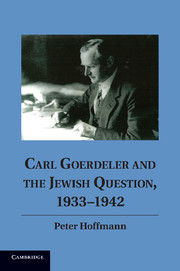4 - Conspiracy to Overthrow the Dictator
Published online by Cambridge University Press: 01 June 2011
Summary
While German armies were advancing eastward and the Soviet Union seemed on the verge of collapse, President Roosevelt and Prime Minister Churchill met in Placentia Bay in Newfoundland, on each others' ships, the Royal Navy battleship Prince of Wales and the American cruiser Augusta, and consulted on common war aims, although the United States was not formally a belligerent. Ulrich von Hassell, until February 1938 German ambassador in Rome, one of the best informed among Hitler's German opponents, reacted with dismay to the Atlantic Charter. He noted in his diary that the identification of ‘Nazi Regime = Germany’, and ‘Germany = Hitler’ in the preceding months had progressed in rapid strides throughout the world and threatened to destroy every possibility for a post-Hitler government to obtain a tolerable peace. Hitler's removal was the condition for Germany not to be identified with Hitler.
On 18 August 1941, four days after the publication of the Atlantic Charter, Hassell had a conversation with Carl Burckhardt, chair of the Commission mixte de secours of the International Committee of the Red Cross. The meeting was arranged by Karl-Ludwig Freiherr von und zu Guttenberg, one of Hitler's underground opponents who worked in Military Counter-intelligence under Admiral Wilhelm Canaris; Guttenberg is said to have put Goerdeler in touch with Hassell in June 1939. They talked about these issues and about ‘regime change’ in Germany. In the days following, in Berlin, Hassell talked with State Secretary Ernst Freiherr von Weizsäcker about his conversation with Burckhardt.
- Type
- Chapter
- Information
- Carl Goerdeler and the Jewish Question, 1933–1942 , pp. 91 - 113Publisher: Cambridge University PressPrint publication year: 2011

